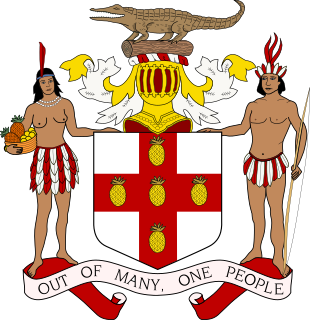
The People's Progressive Movement was a political party in Barbados. It first contested national elections in 1956, when it received 1.7% of the vote, but failed to win a seat. It did not contest the 1961 elections, but returned in 1966, when it received just 0.4% of the vote, again failing to win a seat.

The National Front Alliance is a political party in Guyana.
The Greens of Andorra is a green political party in Andorra.

Early general elections were held in Jamaica on 15 December 1983. The election was boycotted by the main opposition party, the People's National Party, in protest at the refusal of the ruling Jamaican Labour Party to update the electoral roll. Whilst several minor parties participated in the election, most seats were unopposed: in the six seats where voting took place, voter turnout was about 55%, so this translated into a nationwide figure of 2.7%. It allowed the Labour Party to win all 60 seats in the House of Representatives, with their leader, Edward Seaga, continuing as Prime Minister.
The People's Freedom Movement was a political party in Jamaica. It first contested national elections in 1955, but received only 647 votes and failed to win a seat. It did not contest any further elections. The party made a submission to the Joint Select Committee considering Jamaica's independence constitution, arguing for the inclusion of a provision that would allow for a referendum on becoming a republic. The submission was not accepted.
The Republican Party was a political party in Jamaica. It first contested national elections in 1955, but received only 108 votes and failed to win a seat. It did not take part in elections in 1959 or 1962, but returned for the 1967 elections, in which it received only 45 votes. After failing to participate in the 1972, 1976 and 1980 elections it contested the 1983 elections, but received only 257 votes, again failing to win a seat. It did not contest any further elections.
The Christian Conscience Movement was a political party in Jamaica. It first contested national elections in 1983. The elections that year saw a mass boycott as the People's National Party protested against the government. The CCM received only 704 votes, which amounted to 2.7% of the total, and failed to win a seat. It did not contest any further elections.
The United People's Party was a political party in Saint Kitts and Nevis. The party first contested national elections in 1993, when they received 3.1% of the vote and failed to win any seats. In the 1995 elections they received just 71 votes and again failed to win a seat. The party did not contest any further elections.
The People's Progressive Party was a political party in Saint Lucia. It was the only opposition party in the country from 1951 until 1964.
The African National Congress was a political party in Trinidad and Tobago. The party first contested national elections in 1961, when it received just 0.5% of the vote and failed to win a seat. They did not put forward any candidates for the 1966 elections, but returned for the 1971 elections, in which they received 2.4% of the vote, but again failed to win a seat as the People's National Movement won all 36. The party did not contest any further elections.
The Tapia House Movement was a political party in Trinidad and Tobago. It first contested national elections in 1976, when it finished fourth with 3.9% of the vote, but failed to win a seat. In the 1981 elections it ran as part of the Trinidad and Tobago National Alliance together with the United Labour Front and the Democratic Action Congress, but saw its vote share drop to 2.3% and it remained seatless. The party did not contest any further elections.
The Fargo House Movement was a political party in Trinidad and Tobago. It contested the 1981 general elections, but received just 143 votes and failed to win a seat. The party did not contest any further elections.
The West Indian Political Congress Movement was a political party in Trinidad and Tobago. It contested the 1981 general elections, but received just 130 votes and failed to win a seat. The party did not contest any further elections.
The People's Popular Movement was a political party in Trinidad and Tobago. It contested the 1986 general elections, but received just 796 votes and failed to win a seat. The party did not contest any further elections.
The Movement for Unity and Progress was a political party in Trinidad and Tobago. It contested the 1995 general elections, but received just 0.4% of the national vote and failed to win a seat. The party did not contest any further elections.
The People's Empowerment Party was a political party in Trinidad and Tobago. It contested the 2000 general elections, but received just 0.3% of the vote and failed to win a seat. The party did not contest any further national elections, but did run in elections in Tobago. In the 2001 Tobagan House of Assembly elections it won 7.1% of the vote, but again failed to win a seat.

The People's Democratic Movement (PDM) was a centrist political party in Guyana.

The National Labour Front (NLF) was a political party in Guyana.

The Democratic Agrarian Party of Romania was a political party in Romania.
The Liberal Party was a political party in Luxembourg in the 1930s and 1940s.






